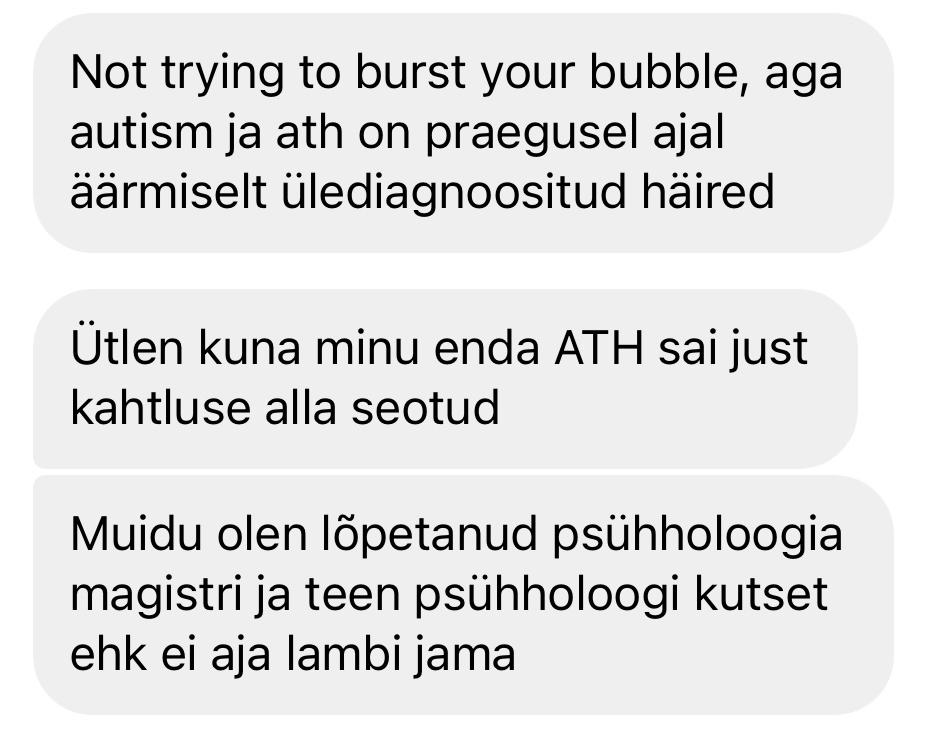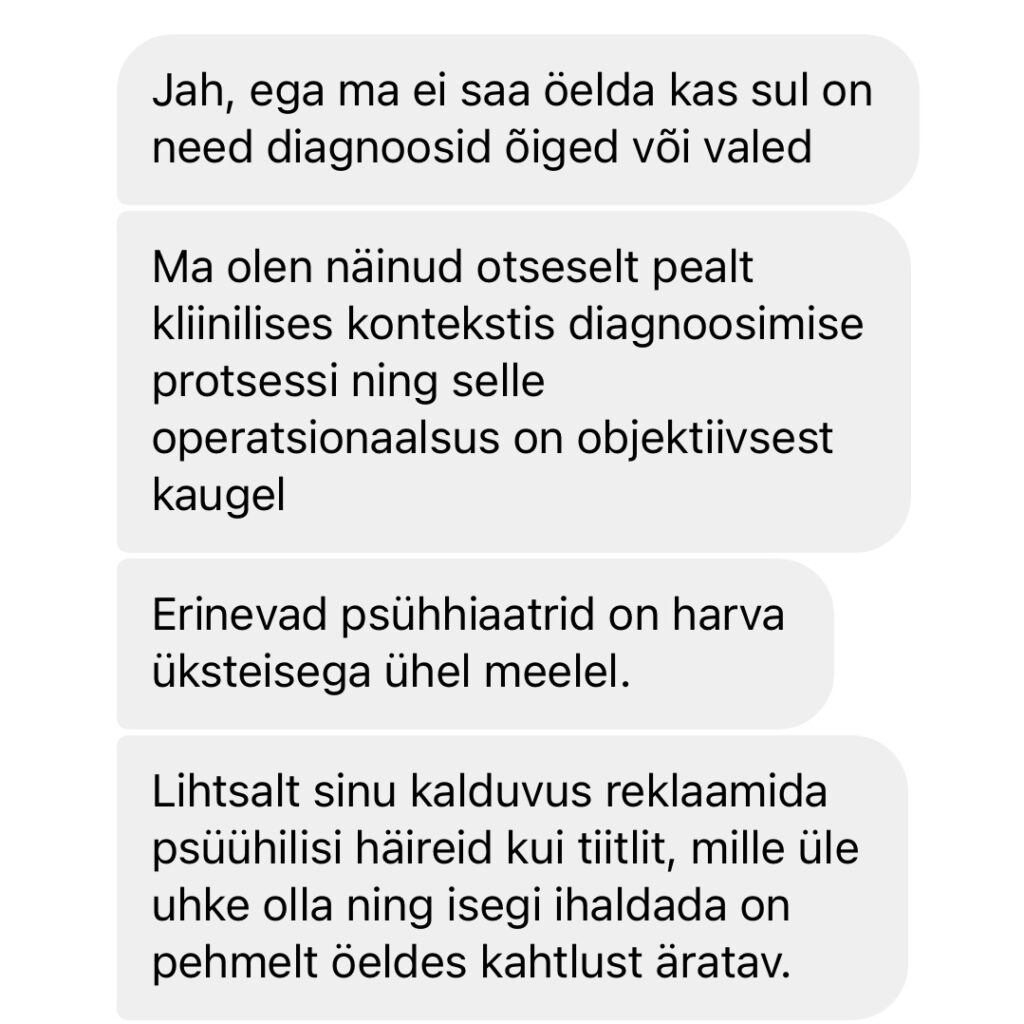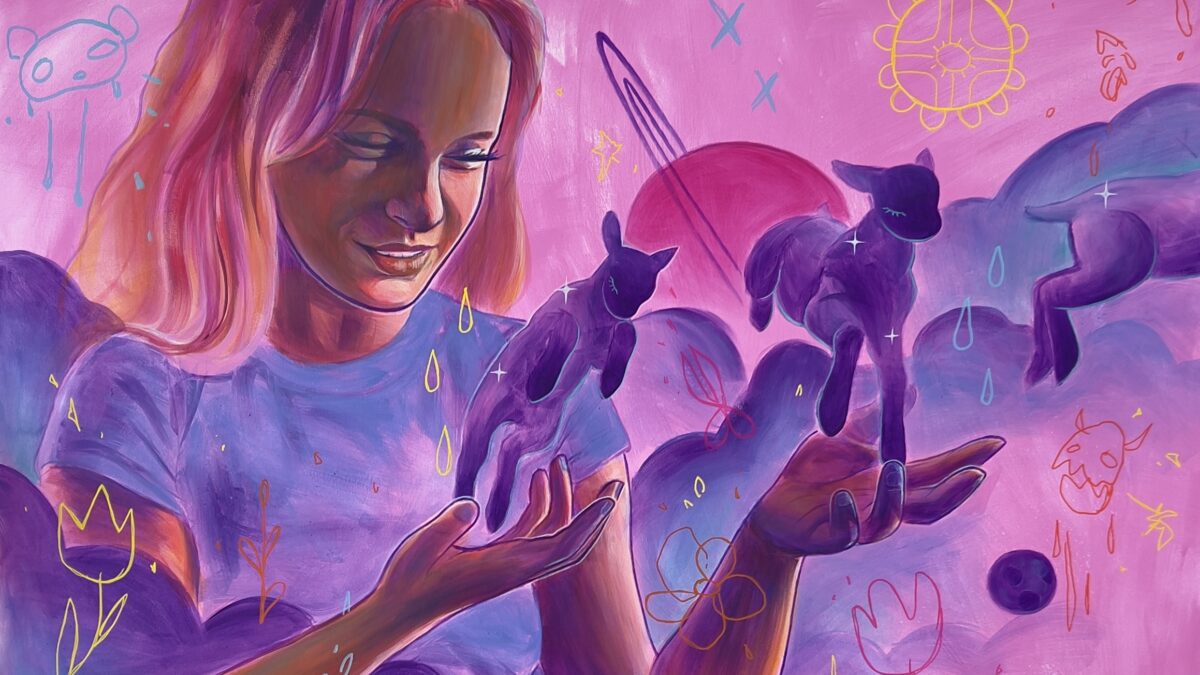The month of May has gained new significance in my life because it is the month when I received my official autism and ADHD diagnosis. This year was the first anniversary of that diagnosis, and it was important for me to celebrate it because that diagnosis marked the beginning of my new life: a journey where I learn to understand and love my needs! My whole life, I have been shamed immensely for who I am, so now it’s time to reclaim what belongs to me: my self-esteem. Thank you!
As usual, I shared this on social media. For me, this is a big part of “unmasking” (masking: neurodivergent people learn to hide their needs and traits throughout life to better fit into society. “Unmasking” is the process of relearning this). It helps me overcome my shame and show others who I am. To celebrate who I am! And to inspire other neurodivergent people to embrace themselves. Unfortunately, shame is often the foundation of mental health diagnoses, and I strive to demolish it to build a new foundation that enhances my quality of life.
Sharing my diagnosis anniversary material on Instagram, it was a joy to see many congratulations, stories about people’s own diagnoses, their struggles, and joys. For me, social media is a tool to bring people together, share stories, and inspire each other!
Among all these lovely messages, I received one very strange avalanche of messages from a complete stranger:


Translation:
“Not trying to burst your bubble, but autism and ADHD are extremely overdiagnosed disorders nowadays.
I’m saying this because my own ADHD diagnosis has just been called into question.
By the way, I have completed a master’s degree in psychology and am practicing as a psychologist, so I’m not just talking nonsense.
Yes, I can’t say whether your diagnoses are correct or incorrect.
I have directly observed the diagnostic process in a clinical context, and its operationality is far from objective.
Different psychiatrists rarely agree with each other.
Simply, your tendency to advertise mental disorders as a title to be proud of and even to desire is, to put it mildly, suspicious.”
I often get all kinds of weird messages from strangers trying to bring me down. A quick Google search revealed that this person works as a psychologist. Initially, I was shocked at how unethical it is for a psychologist to decide to drag a complete stranger and their diagnoses through the mud on social media. Then I started laughing because one actually decided to put their name on a message criticizing our entire diagnostic and psychological/psychiatric system.
Let’s start from the beginning: autism and ADHD are extremely underdiagnosed neurotypes, not disorders. It is known that these neurotypes are genetic, meaning our brains have developed completely differently. The reason these diagnoses are now becoming more common is that information on these topics is finally spreading. Especially concerning women’s diagnoses: most scientific research is conducted on men. This applies to mental health, general health, medications, etc. The requirement is that human trials and studies must be conducted on people, and it is easier to conduct experiments on men (no fluctuating hormones).

Thus, half of the population has been left out throughout history. And isn’t it suspicious that when women start talking about their needs and mental health, it’s now considered a “fashionable disease”? Sounds familiar… wait, wait, hysteria? Fun fact of the day! Hysteria was still diagnosed in women in 1980! Although psychiatrists don’t want to use that word anymore, I’ve received hundreds of messages from women saying that psychiatrists tell them, “You’re imagining your symptoms, and there’s nothing wrong with you.” I’ve also been one of those women.
Since half of the population has been consistently excluded from science, it was believed even in the early 2000s that autism and ADHD were boys’ “diseases” and that one would outgrow them, and that girls/women didn’t have these “disorders”. One of the biggest mistakes in diagnostics when I was a child, and still in many cases now, is not considering how symptoms affect the patient but rather how symptoms affect the people around them. If you can hide your symptoms well from others, then you must not have any problems. If others are comfortable, that’s the most important thing. Girls are especially taught from a young age to behave according to others’ expectations, and if there’s no science supporting our strange behavior patterns… then it’s interesting how suddenly all these women want their diagnoses? It turns out that autism and ADHD diagnoses do not prefer one gender over another, it’s just that half of the population has been excluded from the scientific perspective (and also other skin colors and minority groups as well. That’s a whole separate post).
My personal experience: 14 years of mental health support and psychologists and psychiatrists blindly dealt only with my chronic depression, which only worsened despite their advice. I have received hundreds and hundreds of messages with similar stories from women who have constantly struggled with their mental health, burning out repeatedly and not receiving the right help. Finally, we come across different information through social media, discover that there are different neurotypes and personality disorders that mental health workers have never even suggested!

In my case, I now know for sure that I am autistic + ADHD because the symptoms and support my psychologist and I provide for myself finally suit me. This is how a patient gains confidence that this is the right diagnosis: life becomes easier and more logical because now the help aligns with the diagnosis. It is not okay to reflect your own uncertainty about your diagnosis onto others on the internet, especially if you claim to be a specialist in the field.
This made the psychologist’s comments on Instagram even sadder. I don’t advertise mental disorders as titles. This is my reality, which I have not been offered my whole life. I have been given all kinds of “titles” that are not within my control: stupid, lazy, useless, too slow, annoying, loud, too much, etc. Autism and ADHD diagnoses are answers that finally confirmed that I have mental disabilities and special needs. Does a person in a wheelchair and with mobility issues also advertise their title when sharing pictures of themselves on social media and talking about their life as it is? I get ableism from every corner, every day. It’s extremely sad when it comes from specialists to whom we turn for help.
Regarding this specific individual, I wrote to the company where they work, and they responded that they are dealing with the situation. What and how, they did not want to answer. I was invited to speak in person, but to be honest, I don’t have the energy for it. So, I hope they actually take it very seriously and better train their employees in the future.
As for my readers, please celebrate your diagnoses a hundredfold! Please learn about your needs and know that you are worth fulfilling your needs even on your good days, so you can build the foundation and environment that supports your life on bad and difficult days. The shame surrounding our diagnoses is so deep, but I am here to tell you: you are worth a supportive life and a supportive environment!
Write in the comments, what kind of performance pressure have you received from mental health professionals?




